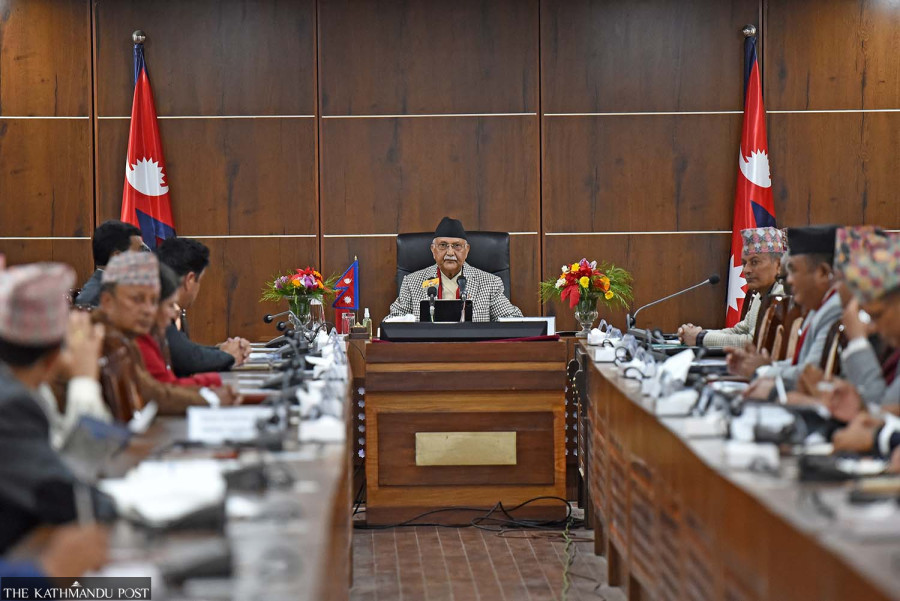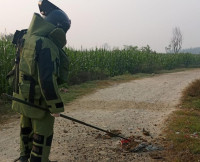National
First Sagarmatha Sambad to be held on May 16-18
Discussions will focus on the theme ‘Climate change, mountains, and the future of humanity’.
Post Report
The government has decided to resume the flagship Sagarmatha Sambad, the first edition of which was to be held in March 2020. The event, which was to focus on the issue of climate change, climate justice, its impacts, and related issues, had to be cancelled due to the Covid pandemic.
Prime Minister KP Sharma Oli announced the resumption of the dialogue amid a function in Kathmandu on Tuesday.
The event will be held on May 16-18, according to a statement issued by the prime minister’s private secretariat.
Inspired by global platforms like the World Economic Forum of Davos, the Shangri-La Dialogue of Singapore, and the Raisina Dialogue in New Delhi, the Sagarmatha Sambad was first announced by the Oli government in 2019, but was canceled due to the pandemic.
During a joint function organised by the Ministry of Foreign Affairs and the Ministry of Forest and Environment on Tuesday, the prime minister officially launched the resumption of the Sagarmatha Sambad, a multi-stakeholder forum aimed at deliberating on important global, regional and national issues. This time Nepal has decided to focus on the issue of climate change, climate justice, and related issues.
The venue for the dialogue is yet to be decided, but it is expected to be organised in Kathmandu.
Taking the lead among mountainous countries and several problems they are facing, particularly in the area of climate change, the theme of the first Sambad will be “Climate Change, Mountains and Future of the Humanity”, according to the Ministry of Foreign Affairs.
Heads of state and government and other stakeholders working in the field of climate change will be invited to the forum, according to officials.
Earlier, Nepal had taken several initiatives to raise awareness about climate change, like drawing the attention of the International Court of Justice to its impacts and making a strong plea for climate justice to alleviate the suffering climate change has inflicted on the Nepali people.
During a presentation at the court’s public hearings on the ‘Obligations of States in respect of Climate Change’ on December 11, Minister for Foreign Affairs Arzu Rana Deuba said that global warming and consequent climate change increasingly threaten Nepal’s snow-capped mountains and glaciers.
To showcase the impact of global warming, in December 2009, the government also hosted a Cabinet meeting at Kala Patthar near Mt Everest. But this is the first time Nepal is taking the lead as a mountainous country to further sensitise the donor community, major contributors to carbon footprints, and multilateral agencies working in this field.
In November 2023, at the government’s invitation, United Nations Secretary General Antonio Guterres visited Nepal and travelled to the Everest and Annapurna regions, which have been highly affected by the impacts of climate change, and delivered a global message about the vulnerabilities of climate change.
“It’s time to stop the looting and generating climate change because we must preserve these wonderful mountains and these wonderful glaciers,” Guterres told media persons at Pokhara Airport. “And it’s essential to support Nepal and… other countries that do not contribute to climate change but suffer the consequences.”
Guterres, who addressed the joint sitting of Nepal’s federal parliament the next day, said the country was facing catastrophic consequences of climate change despite its negligible contribution to global emissions.
In his address to the 79th session of the UN General Assembly in September last year, the prime minister raised the issue of climate change and its impact on poor nations like Nepal whose contribution is minimal but which bear the gravest impacts of climate change and global warming.
PM Oli had informed UN Secretary-General Guterres about Nepal’s plan to convene the Sagarmatha Sambad to champion the agenda of the mountain ecosystem, and invited him to address the dialogue platform. According to the Office of the UN Secretary-General, the meeting also touched on climate change, particularly the mountain agenda.
After their meeting, Nepal’s permanent mission in New York said in a press statement that the secretary-general had emphasised climate change as a priority for the UN, and highlighted the need for a drastic reduction of greenhouse gas emissions and addressing vulnerabilities of mountain countries like Nepal.




 22.6°C Kathmandu
22.6°C Kathmandu














